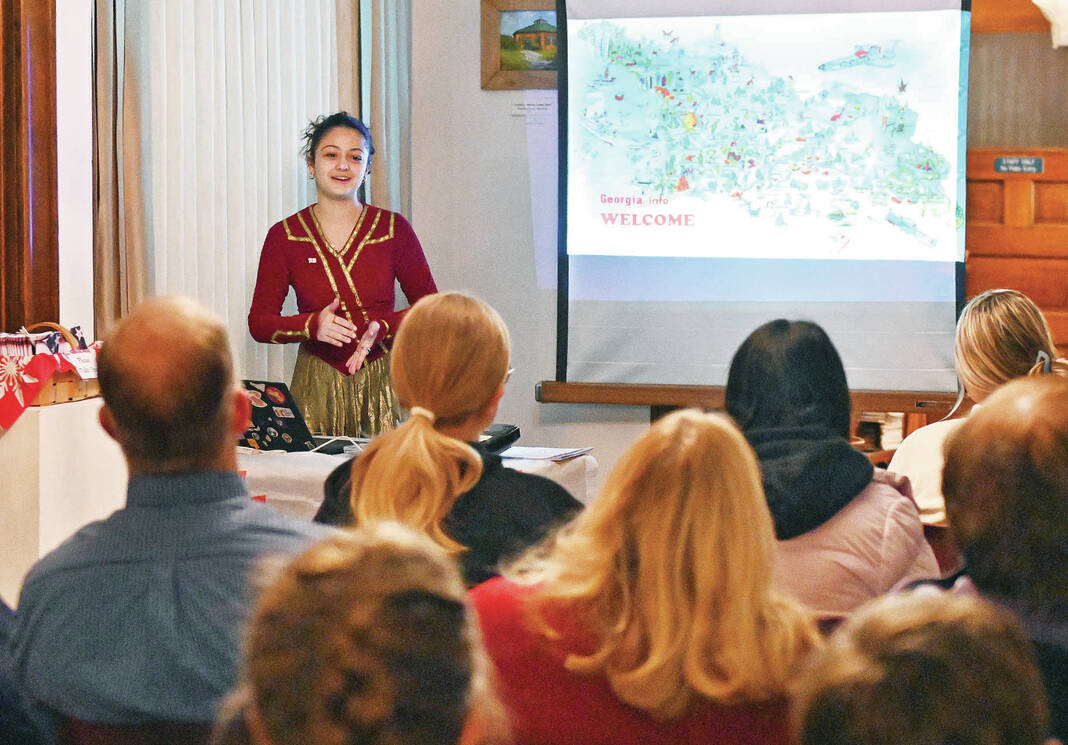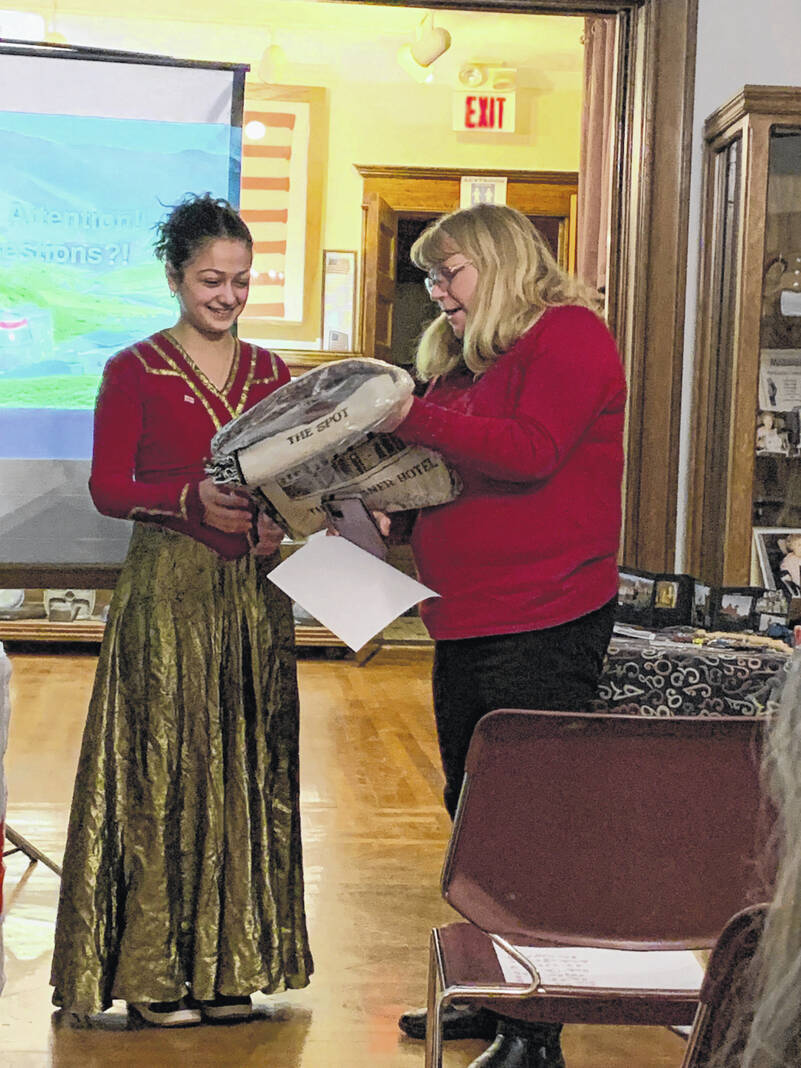
Georgian exchange student Lizi Nebieridze gives a talk on her home country at the Ross Historical Center on Wednesday, Jan. 31.
Luke Gronneberg | Sidney Daily News

Shelby County Historical Society Executive Director Tilda Phlipot, right, gives Georgian exchange student Lizi Nebieridze a blanket with historical landmarks in Sidney after her presentation on her home country at the Ross Historical Center on Wednesday, Jan. 31.
Charlotte Caldwell | Sidney Daily News
By Charlotte Caldwell
SIDNEY — Lizi Nebieridze — a junior at Anna High School and an exchange student from the country of Georgia — gave a presentation about the history and culture of her home country to over a dozen people at the Ross Historical Center on Jan. 31.
Georgia, known to Georgians as Sakartvelo, is located in eastern Europe and western Asia, bordering the Black Sea, in between Turkey and Russia. It is slightly smaller than South Carolina. The terrain is mostly rugged and mountainous and the climate is mild. The population is 3.6 million. While some people might think Georgia is part of Russia, Georgia has been an independent country since 1991 when it gained independence from the Soviet Union.
Georgia has a rich history dating back to the early 11th century and even earlier as a recent discovery of a 1.8 million-year-old tooth belonging to an early species of human made the region one of the earliest prehistoric human settlements in Europe and possibly anywhere outside Africa, according to a Reuters article.
Nebieridze’s presentation also mentioned that Georgia is the home of the deepest known cave on Earth — Veryovkina Cave — at 7,257 feet deep, and that Georgia has over 500 caves.
The Georgian alphabet has 33 letters and there are three different iterations of the written Georgian language.
Religion is a crucial part of Georgia, and its flag depicting five crosses pays homage to that. There are about 250 churches in Georgia and Orthodox Christianity is the main religion.
Native food Nebieridze mentioned included khachpuri — a cheese bread filled with multiple kinds of cheeses and a runny egg; khinkali — meat-filled soup dumplings; and churchkhela — a candle-shaped candy made of juice-coated nuts.
Exchange programs
Nebieridze explained she is here for one year, all expenses paid, because of the Future Leaders Exchange Program (FLEX). Her placement organization is ASSE and World Heritage.
According to the FLEX website, “FLEX is a highly competitive, merit-based scholarship program funded by the U.S. Department of State that operates in Armenia, Azerbaijan, the Czech Republic, Estonia, Georgia, Greece, Hungary, Kazakhstan, Kyrgyzstan, Latvia, Lithuania, Moldova, Mongolia, Montenegro, Poland, Romania, Serbia, Slovakia, Tajikistan, Turkmenistan, Ukraine, and Uzbekistan. Over 35,000 students compete annually in multiple rounds of testing to earn a FLEX scholarship, which provides for them to spend an academic year in the United States living with a volunteer host family and attending a U.S. high school.
While in the U.S., FLEX students gain leadership skills, learn about American society and values, and teach Americans about their home countries and cultures. FLEX students perform community service in their U.S. communities and act as ambassadors of their home countries. Many are inspired by this spirit of volunteerism to develop and implement innovative projects in their home countries, using the skills and ideas they gained while on program. FLEX students are naturally curious and enthusiastic citizens of the world.”
About Nebieridze
Nebieridze lives in the western Georgia municipality of Zestafoni, which has a ferro-alloy plant that processes raw manganese ore and is one of the winery centers of Georgia. Nebieridze said most families have wine-making areas, and she has one for her family.
Nebieridze has earned 100.5 volunteer hours in the U.S. which helped her get chosen for a California conference to meet other exchange students. Only eight out of 300 exchange students were chosen for the conference. Currently, one of her volunteer projects is repainting the alphabet rocks at Anna Park.
Nebieridze wanted to come to the U.S. because, “As a child when I was watching some movies I always was dreaming to come here, but then I grew up and I learned about this program I mentioned in the beginning (FLEX) and it became my purpose to come to America because I wanted to experience my side, because you are seeing things on the TV shows that sometimes are not real, and I wanted to experience for myself, and I also like the freedom in America.”
So far, she has visited Cleveland, Columbus, and Indiana, and will soon visit Washington, D.C. and California. She said her host family also has a surprise trip for her planned in April.
She also answered multiple questions from the audience about her life in Georgia and the differences she has experienced in the U.S.
She said her school in Georgia is the size of Anna High School and her town is the size of Sidney. The differences between schools are they don’t have to move classrooms in Georgia — instead, the teachers rotate classrooms — and they’re with the same students every grade. They use a 10-point grading system. Nebieridze is currently studying chemistry in Anna when she learned chemistry in Georgia in the eighth grade.
She knows many languages, including Georgian, English, and Turkish, and she’s studying German and Spanish. She was studying Russian when she decided it wasn’t worth her time. In her country, the older generation knows Russian because they had to, but the younger generation tries not to learn it.
In her free time in Georgia, Nebieridze participated in Georgian national dancing. Georgian dances show the relationship between men and women and the history of the region. She’s been dancing for eight years, and she wore one of her dance dresses for the presentation. She was also involved in theater club, volunteering, swimming, and youth council in Georgia.
She misses food, dancing and family from Georgia the most, although she said her host mom is a good cook. Her favorite restaurant in the U.S. is Waffle House, and she also enjoys hamburgers.
When asked what her family thought about her coming to the U.S., she said, “I was two years old when my father died, and my whole childhood I grew up with my mother and we have never been apart. So it was so hard for her. But last year with my grandma I went on vacation in Turkey so it was a good experience for her and for me for the future to know that we had to be apart for some reason. And the only thing she says to me is that’s for your future, and I don’t care. We will still be together and you will be back. She’s a strong woman.”
Nebieridze’s friends in Georgia are curious about life in the U.S. and she tells them about holidays she has experienced. She said, “I would talk about the stereotypes they have about America because now when I see a lot of things by my eyes, now I know what is true and what is not… Mostly I’m always talking about the school because the school is so different and the study system.”
Nebieridze mentioned having a culture shock moment. “The culture shock I had was in a restaurant when they were filling the cups, in my country they’re not refilling, you have to pay again, and my host family told me it’s the same price,” she said.
Her future plans are to come back to the U.S. after graduation for college. She is not sure what she wants to study yet. After college, she will go back to Georgia.
Relations between Georgia and Russia
Nebieridze discussed the recent war between Russia and Georgia in 2008 and current tensions.
“When Russia and Ukraine were starting (war), we were not under protection because we are close to Russia. There was a big possibility they might come and invade our country too and start a war because we were not supporting Russia, we were supporting Ukraine,” she said. “And now, when the war is still going on, Russians are coming to our country to live in peace because they can’t live in their country… They’re expecting us to treat them respectfully when they are not and they are asking us why we’re not talking in Russian to them when they are doing such kind of stuff to us because they still have about 20 percent of our country.”
Host family
Nebieridze is the seventh exchange student her host family — Dan and Cindy Ellenwood — have hosted.
“She’ll be our last one. We wanted to end on a really good one. My husband’s retired and I’ll soon be retiring and we’ll be traveling and doing other things, so we just wanted to have one last hurrah before we finished,” Cindy said.
“I was an exchange student myself. I went to Germany, and when my daughter was like eight years old, I saw an advertisement in the paper of a host family wanted for a student from Germany and I thought that would be fun because I had such a great experience with it, and it just started the ball rolling,” Cindy continued. Other exchange students they have hosted have been from Ukraine, Kazakhstan, and Russia. The Ellenwoods still keep in touch with their past exchange students and have visited Germany. They would like to go to Kazakhstan and Georgia next.
“I highly recommend that everyone should host an exchange student from ASSE program. Experiencing the learning a new culture and sharing our family and village and customs and culture and country with a child is so rewarding,” Cindy said. “To see ourselves through a student’s eyes experiencing new sights, food, culture is almost like experiencing it again for our first time. Seeing the joy and surprise and love on their faces. It reminds you of all the littlest things we have taken for granted from seeing and doing over and over.”
“I highly recommend that experience for everyone to have at least once,” Cindy concluded.

